|
home
plays
biography
best scene
shop
forum
hot news
photos
much more
- films
- in-depth
- books
-
articles
- glossary
- links
- more links
- search
- site map
- contact
- cold news
all the sites |
Magazines
|
|
|
Theatre Forum 2002
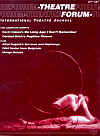
Includes "A Gift for His
Birthday" about Sorrows and Rejoicings by
Marianne McDonald. Issue nr 21. Good
analysis of Sorrows and Rejoicings.
"the play is a wake, and an awakening
of memories about a man who has died. There
is a series of memories in which Dawid appears-
five in fact- just like the acts of a Greek play;
and the women are the chorus who define
Dawid"
and some good insights into Fugard
"I and my writing belong to a world
where a lot of people can't put words on paper
and tell their story".
|
|
Theater Week 1995
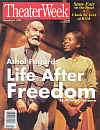
An interview with Fugard by Michael P.
Scasserra. It took place as Valley Song was
being premiered.
"You can dig very deeply into the
human heart when you are only dealing with two
characters".
|
|
Twentieth century
Literature, Winter 1993

Some
problems of a playwright from South Africa-
Transcript
"No way out": 'Sizwe Bansi is Dead' and
the dilemma of political drama in South Africa by
Andre Brink
Drama and politics in a state of emergency: Athol
Fugard's 'My Children! My Africa!'by Nicholas
Visser
The apprenticeship years by Sheila Fugard
Encounters with Fugard: native of the Karoo by
Mary Benson
Fugard masters the code by Gerald Weales
Crossing boundaries: the genesis of the township
plays by Dennis Walder
Life in the theatre: autobiography, politics, and
romance in "Master Harold" … and
the boys by John O. Jordan
A tribute for Athol Fugard at sixty by Don
Maclennan
Power, self, and other: the absurd in 'Boesman
and Lena.' by Craig W. McLuckie
The artist as an outcast and a mother in 'The
Road to Mecca.' by Janet Ruth Heller
Introduction: Fugard, women, and politics by Jack
Barbera
Fugard as director: an interview with the cast of
'Boesman and Lena.' Interview by Jack Barbera
Realizing Fugard by Susan Hilferty
You can read the articles on-line.
Click the image.
|
|
Theater, Winter 1982
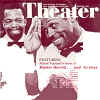
The full text of Master Harold, plus photos
from the production, and interesting interviews
with Fugard (by Heinrich von Staden) and with
Zakes Mokae (by Alisa Solomon).
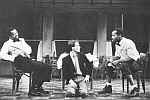
Mokae:
"Anyhow, Athol would leave sometimes, and
then he'd come back with a new play. One time he
came back with The Blood Knot.
We performed the play on a hot Sunday night and
it lasted more than four hours. On Monday the
papers were raving about it...it all happened so
fast the government couldn't do anything about
it"
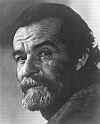
Fugard:
"You don't have a university degree."
"No, and the language academics use
sometimes makes me wonder whether I, in fact,
speak English or not".
"Talk. Talk. Talk. That doesn't change
a farthing".
|
|
Theater fall/winter
1987
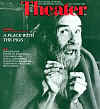
The full text of A Place with
the Pigs, plus photos from the
production, and an interesting interview with
Fugard by Gabrielle Cody and Joel Schechter.
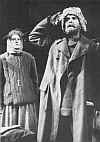
"...all plays risk some hazards. The
Road to Mecca was for some people
about getting old and going to an old age
home..."
"[Boesman and Lena]...
it is Lena's point of view and it is Lena's
journey, with Boesman an attendant and terrible
presence in her drama. You don't really get in to
Boesman in the way you get in to Lena... That
situation is reversed in Pigs".
|
|
Related
books
|
|
The Drama of South
Africa 1999
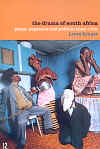
An overview of "plays, pageants and
publics since 1910" by Loren Kruger. A very
good overview of South African theatre. As well
as Fugard it has comprehensive sections on for
example the writer Dhlomo and the play King Kong.
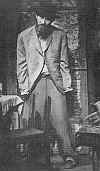
"The actors...introduced themselves
using the names of characters they had played in
previous Serpent productions...this gesture
directed the audience to the implications of the
actors rather than the personal motivations of
the characters, while also hiding the identity of
the actors from the security police".
|
|
Writing South
Africa: Literature, apartheid and democracy, 1970-1995
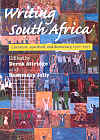
A collections of essays, edited by Derek
Attridge and Rosemary Jolly. Articles about
writers such as Andre Brink and Coetzee, as well
as lesser known writers.
Dennis Walder“s Spinning out the Present:
narrative, gender and the politics of South
African theatre includes a significant section on
Fugard "nor de we have all the detail we
need about the creative input of key performers
in all the work associated with Fugard-
performers such as Zakes Mokae, John Kani,
Winston Ntshona, and especially, Yvonne
Bryceland".
|
|
Playing the Market:
The Market Theatre Johannesburg 1976-1986
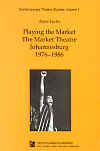
A history of the theatre by Anne Fuchs,
1990. Interesting is the developments of
two streams of white theatre liberalism: the one
encouraging black theatre, the other not getting
involved unless invited: "Barney Simon
adapted the stance advocated by the Black
Consciousness Movement for a white cultural
sympathizer: non-interventionist but ready to
help if asked to by Africans on their own
terms... Fugard whose association with the
Serpent Players and their subsequent introduction
to the Space Theatre appears to have been very
much on his terms".
And on Hello and Goodbye
"...before Athol's next play, Hello
and Goodbye in 1965, both audiences and casts had
become segregated by law. It was at this point
that Ian Bernhardt...with Barnie Simon and
others, formed The Phoenix Players, which gave
private performance to African audiences while
presenting the same productions to all-white
audiences at the Library Theatre in
Johannesburg".
"The hall was packed out and by the
time the interval came round there were no aisles
left at all. Everyone had just packed up their
chairs and moved them further forward to be
nearer the stage. Then it rained and the hall
leaked but no-one left. They just turned up their
collars and sat on".
|
|
At the Royal Court
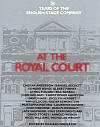
25 Years of the English Stage Company,
edited by Richard Findlater, 1981. Various
playwrights and actors discuss their involvement
with the Royal Court Theatre. Fugard is
covered with five pages, covering Boesman and
Lena, Sizwe Bansi is Dead, The Island and
Statements After an Arrest Under the Immorality
Act. "I will be grateful to the Royal Court
till my dying day. I have just one regret:
that I never acted there, though Oscar
[Lewenstein] wanted me to".
Sizwe Bansi in 1977 ran for 41
performances, with the highest number of seats
sold in the year- 72%, second was Waiting for
Godot with 53%. Sizwe grossed £23,075.
There are good photos (Fugard as Boesman
below):
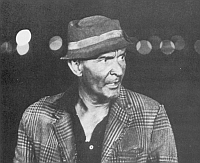
Other playwrights covered include Osborne,
Beckett, Wesker, Bond and Hare.
|
|